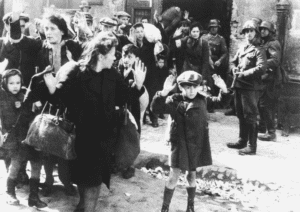Howard Fischer
Uppsala, Sweden
“All it took was a Führer’s madness and several million well-raised Germans to extinguish the lives of
countless millions of innocent human beings in the space of a few short years.”
– Alice Miller, Ph.D.
 |
| Jewish women and children removed from a bunker. From the Stroop Report, a report written by Jürgen Stroop for Heinrich Himmler about the liquidation of the Warsaw Ghetto in May 1943. Via English Wikipedia. Public domain. |
This article is based on the chapter “Adolf Hitler’s childhood: From hidden to manifest horror,” in Alice Miller, For Your Own Good: Hidden Cruelty in Child Rearing and the Roots of Violence, New York: The Noonday Press, 1990.
Alice Miller, Ph.D. (1923–2010), was born in Poland to a Jewish family. During World War Two she lived in Warsaw under an assumed name. In 1946, she immigrated to Switzerland, where she earned a doctorate in psychology in 1953. She practiced psychoanalysis from 1960 to 1980 and after that wrote thirteen books (1979–2009) on the effects of child abuse.1
Child rearing in Germany and Switzerland, wrote Miller, is based on the notion that the parent is always right and has complete power over the child. The child can be physically punished or humiliated for cause or without cause and is not permitted to express his unhappiness and feelings about such treatment. He is told it is “for his own good.” He learns that obedience is the way to avoid punishment. He holds his feelings inside until he becomes a parent himself and can express them by punishing his own children. Miller wrote about these concepts as they were expressed in the childhood of Adolf Hitler.
Alois, the abusive, alcoholic father of Adolf Hitler, was born to an unmarried servant girl and lived in poverty as a child, away from his mother. Worse, there was a suspicion that his own biological father was a Jew, causing him to be treated differently and excluded. Yet although his childhood was filled with humiliation and rage, he grew up to become a highly respected government official.
Alois envied his son, Adolf, who unlike himself was born in wedlock in what had become a middle class respected family. He beat Adolf daily, once at age eleven nearly fatally, and he called him by whistling for him as one would for a dog. Adolf’s mother, Klara, was also beaten by her husband (who was also her uncle) and was a passive bystander when her son was beaten.
The year before Adolf’s birth, Klara Hitler lost three children to diphtheria, which produced poor emotional conditions in which to raise a newborn. She transferred her fears and anguish to Adolf, idealized her dead children, and expected her living children to embody her fantasies of the “perfect” dead children. An aunt who also lived in the household was described as schizophrenic and hunchbacked. Young Adolf was not allowed to express his fear of her. He never had anyone in whom he could confide. Miller repeatedly mentions in her discussion that understanding the origin of Hitler’s beliefs and destructive actions is in no way an exoneration of them.
In 1930, the rising politician Adolf Hitler learned about the suspicions that his father had Jewish ancestry. Hitler transferred his unexpressed hatred of his father to a hatred of the Jews. There was no “penalty” if Germans expressed hatred for the Jews. Germans displaced qualities that they feared they themselves possessed such as empathy and weakness onto the Jews. These forbidden and dangerous notions needed to be extinguished. The hated father, Alois Hitler, could not remove the “stain” of a suspected “wrong” (Jewish) ancestry. Jews in Nazi Germany had to wear a yellow star to make their “stain” visible. And just as young Adolf did not know when or why he would get a beating from his father, Jews in the Third Reich were made to live in a constant state of fear and uncertainty.
Hitler found it easy to unite people in hatred. He allowed Germans’ lifelong hatred of their parents to be directed and released at the Jews. The Jews had already been persecuted for 2,000 years. Now, parents could still be idealized and honored.
After the Anschluss with Austria, Hitler had the birthplace of his father and the burial site of his paternal grandmother destroyed by the Wehrmacht. He cut off all contact with his half-brother and made his sister Paula, who was his housekeeper, change her name. The painful past needed to be wiped out. Miller suggests that the laws permitting “euthanasia” (murder) of the mentally and physically handicapped was connected to Hitler’s memory of his schizophrenic aunt. For Miller, the totalitarian state was a “mirror” of Hitler’s upbringing. Obedience was everything in a poisonous culture that deformed the personality of the adults and encouraged them to abuse their children.
Reference
- Alice Miller. Wikipedia.
HOWARD FISCHER, M.D., was a professor of pediatrics at Wayne State University School of Medicine, Detroit, Michigan.
Summer 2022 | Sections | History Essays

Leave a Reply